Browse Exhibits (18 total)
March Madness 2021

Share your memories of the Ramblers in the March Madness 2021 Men's Basketball NCAA Tournament.

Explore the Collection: See the memories others have submitted
Loyolans During the COVID-19 Crisis

We find ourselves living through a historic crisis and future historians will want to know how we spent this time.
To document this moment, Loyola University Archives is seeking the Loyola community’s experiences and reflections of life during the COVID-19 pandemic. We invite students, alumni, faculty, staff, and administrators to keep a journal and to submit any stories, videos, photographs, art, or reflections. These items will be kept in the University Archives for future generations to experience. To participate, please submit any items using the form below and please indicate if you are a student, alum, faculty, staff, or administrator in your submission.
What should I document? Documented experiences could range from direct observations to artistic reflections on topics such as working from home, the shift to online teaching/learning, changes to daily life, or social distancing. Any aspect of your experience and how you spent time during this crisis could be documented and submitted. Click on What to Document to see suggestions.
Items donated will be made public and can be found by clicking on the Explore page located to the right.
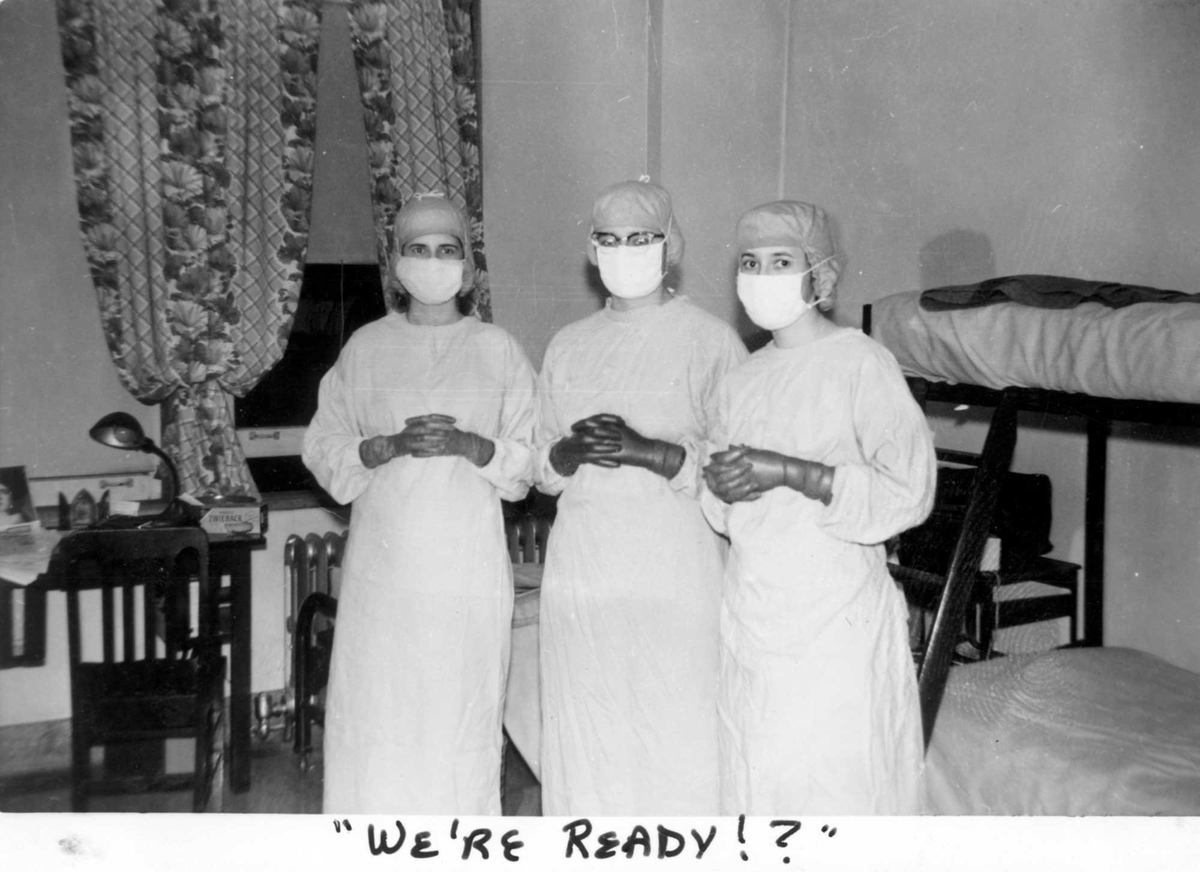
Loyola nursing students dressed for surgery, 1954
Documenting March Madness 2018

Share your memories of the Ramblers in the March Madness 2018 Men's Basketball NCAA Tournament.

Explore the Collection: See the memories others have submitted.
It's Hell But Here We Are Again - Art Young cartoons from the collection of Anthony J. Mourek

Arthur Henry Young, better known as Art Young, was an American political cartoonist and artist. He was born in 1866 near Orangeville, Illinois, but his family moved to Monroe, Wisconsin shortly afterwards. Young moved to Chicago in 1884, where he studied at the Academy of Design and worked for the Daily Mail and Daily News. He began working for the Chicago Inter-Ocean in 1892, but left in 1895 to work briefly for the Denver Times before moving to New York. Some of Young’s early cartoons reflect the Republican politics of his editors, politics which he largely shared. In New York, however, Young embraced socialist politics and became a frequent contributor to the The Masses, the Yiddish satirical magazine Der Groyser Kundes (“Big Stick”), and other socialist publications, even becoming a founder of the socialist magazine Good Morning. He also contributed regularly to mainstream publications like Puck, Judge, and Life.
Young published a number of books, including several which, inspired by Dante’s Inferno, featured updated versions of Hell that reflect Young’s worldview: Hell Up to Date (1892), Through Hell with Hiprah Hunt (1901), and Art Young’s Inferno (1934). Young also had a strong sense of his own importance—he published two autobiographies, On My Way (1928) and Art Young: His Life and Times (1939), and many of the items presented in this exhibit are available only because he saved the majority of his original drawings.
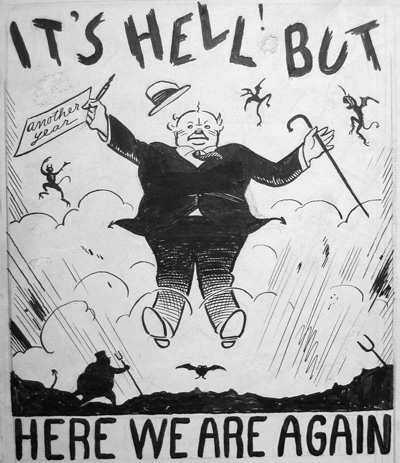
Letters of 19th and 20th Century Women Writers

The 19th and 20th centuries are rich with the literary works of women writers who, previous to that point, were largely dismissed by patriarchal attitudes and other societal restraints. A number of women authors between these two centuries received literary fame for their works, but for many, the recognition of their work has declined over time. A book from the University of Otago in New Zealand, In Her Hand: Letters of Romantic-Era British Women Writers in New Zealand Collections inspired this exhibit as a way to pay respect to women writer's whose names and works have been widely forgotten. In this exhibit, five women writers, Joanna Baillie, Alice Brown, Mary E. Wilkins Freeman, Louise Imogen Guiney and Sarah Orne Jewett, and their letters are presented. All of these women established themselves in literary circles throughout the United States and the United Kingdom and produced great works of literature, poetry, drama and essays. Through their letters, we gain a glimpse into the personal lives and relationships of these literary experts. All letters are from the Autograph Collection at the Loyola University Chicago Archives and Special Collections.
Legion Młodych Polek

Od czasu założenia w 1939 r., aż po dzień dzisiejszy Legion Młodych Polek nieprzerwanie pozostaje niedochodową organizacją w dużej polsko-amerykańskiej społeczności Chicago. Od prawie 80 lat Legion wspiera Polaków w Polsce oraz, polskich emigrantów i Amerykanów polskiego pochodzenia w Stanach Zjednoczonych poprzez dotacje na różne cele dobroczynne i kulturalne jak i na promowanie polskiego dziedzictwa.
Wystawa ukazuje historię Legionu Młodych Polek od jego założenia na początku II wojny światowej aż do chwili obecnej. Wystawa jest podzielona na 4 części: pierwsze trzy sekcje ułożone tematycznie ukazują założenie Legionu i jego wczesne lata (1939-1950), działalność organizacji i jej cele oraz kluczowe wydarzenia. Ostatnia część wystawy ukazuje jak istotna w środowisku polsko-amerykańskim Chicago jest wciąż rola Legionu Legion Młodych Polek i jakie to ma znaczenie dla jego członkiń.
Wystawa składa się z materiałów i dokumentów Legionu Młodych Polek i centrum archiwalnego Women and Leadership Archives. Zródłem informacji były gazety, korespondencja, fotografie, dokumenty administracyjne i finansowe, programy imprez oraz materiały audio-wizualne znalezione w zbiorach. Dodatkowo przeprowadzono wywiady z członkiniami i miłośnikami Legionu Młodych Polek i dołączono je do archiwalnej kolekcji.
Kredyty
Wystawa „Legion Młodych Polek” została stworzona przez Laurę Pearce w imieniu Archiwum Kobiet i Liderów (WLA) oraz Legionu Młodych Polek z okazji 75. rocznicy powstania Legionu w 2014 r. Specjalne podziękowania kierujemy do Mary Anselmo, Lucie Bucki, oraz Shirley Dudziński za przekazane nam porady oraz ich współpracę podczas tworzenia i planowania wystawy. Dodatkowe podziękowania przekazujemy Kahlee Leingang, asystentce archiwum WLA i Nancy Freeman, dyrektor WLA, za wsparcie oraz pomoc. Fundusze na wystawę przekazał Legion Młodych Polek i Biblioteki Uniwersyteckie, Loyola University Chicago. W 2019 r. wystawa została przetłumaczona na język polski przez Agnieszkę Sarrafian i Justine Tobiasz, a aktualizacji dokonał Nathan Ellstrand.
The Ellacuría Tapes: A Martyr at Loyola

This exhibit reveals the ways in which faculty, staff, and students at Loyola responded to the conflict in El Salvador and the murder of Fr. Ellacuría and his fellow priests. Using archival footage of Ellacuría's visit to Loyola, as well as images and documents from a variety of sources, this exhibit shows how Loyola played a central role in the solidarity movement in the 1980s and early 1990s.
The Legion of Young Polish Women

From its founding in 1939 to today, the Legion of Young Polish Women (Legion Młodych Polek) has remained an enduring non-profit organization within Chicago’s large Polish-American community. For over 75 years, the Legion has worked to support the people of Poland, Polish immigrants, and Polish-Americans through funding charitable organizations, supporting cultural events, and promoting Polish heritage.
This exhibit traces the history of the Legion of Young Polish Women from its founding at the beginning of the Second World War (WWII) to the present. The exhibit is divided into four sections; the first three sections are arranged thematically, exploring the Legion’s founding and early years (1939-1950), the organization’s activities and causes, and its iconic events. The final section of the exhibit explores how the Legion of Young Polish Women has continued to remain a vital part of Chicago’s Polish-American community and what it means to its members.
The exhibit was created utilizing materials from the Legion of Young Polish Women Records at the Women and Leadership Archives. Sources included newspapers, correspondence, photographs, administrative and financial documents, programs, and audio-visual material found in the collection. Additional contemporary interviews for this exhibit were conducted with members and supporters of the Legion of Young Polish Women and have since become part of the archival collection.
G is for Gorey—C is for Chicago: The Collection of Thomas Michalak

Didactic material to accompany G is for Gorey—C is for Chicago, prepared by Thomas Michalak, Curator.
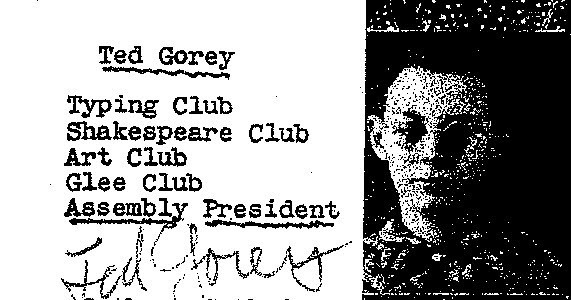
Activist Mundelein: Civic Engagement at a 20th Century Women's College

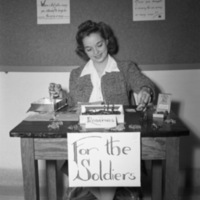
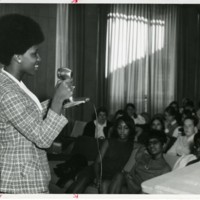
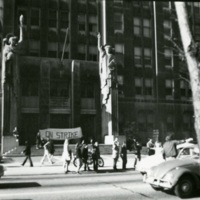
May 1970 witnessed a Mundelein College unlike any other. From students picketing down Sheridan Road to demands for better funding of Black student organizations, campus-wide debates to dorm room arguments, the Antiwar and Civil Rights Movements of the late 1960s exploded onto the Chicago campus.
Mundelein College, a Catholic all-women’s school in North Chicago, was no stranger to student activism. In the 1940s, co-eds baked pies for GI soldiers. In the 1950s, Young Republicans started campaigning. And in the 1960s, students revolutionized their curriculum to allow for more self-directed study. In many ways, civic engagement at Mundelein College mirrored the same student protest happening in universities across the United States. On the other hand, Mundeleinites expressed their social vision in ways undoubtedly shaped by their education at a women’s Catholic college.
This exhibit traces the history of student activism at Mundelein College from the 1940s through the early 1970s. In particular, the exhibit shows the ways in which students took part in the Antiwar and Civil Rights Movements, which eventually came to a head in May 1970. This exhibit Activist Mundelein explores the history of civic engagement through a collection of audiovisual materials, most significantly the Mundelein College Oral History Project. Other sources, including newspapers and photographs, strengthen the exhibit’s main arguments. The exhibit includes four sections: Activist Mundelein, 'We started in '68,' Antiwar Mundelein, and May 1970.
Mundelein College, founded in 1930 by the Sisters of Charity of the Blessed Virgin Mary (BVMs), affiliated with Loyola University Chicago in 1991, at which time it stood as the last all-women’s college in Illinois. Click here for a time line of Mundelein’s history.